When the world’s largest fund manager tells its clients that it plans to swiftly exit its thermal coal investments over the next six months, this should tell us something important.
BlackRock manages around USD$7 trillion of funds on behalf of investors and up to now has been cautious in its response to climate change and slow to participate in investor campaigns. But that just changed, for good economic reasons. Recent analysis published by the Institute for Energy Economics and Financial Analysis (IEEFA), estimated that BlackRock lost as much as USD$90 billion in investment value due to poor investments in fossil fuel companies in 2019. The IEEFA assessment also found that investments in just four fossil fuel companies, ExxonMobil, Chevron, Royal Dutch Shell and BP accounted for around three-quarters of the USD$90 billion loss.
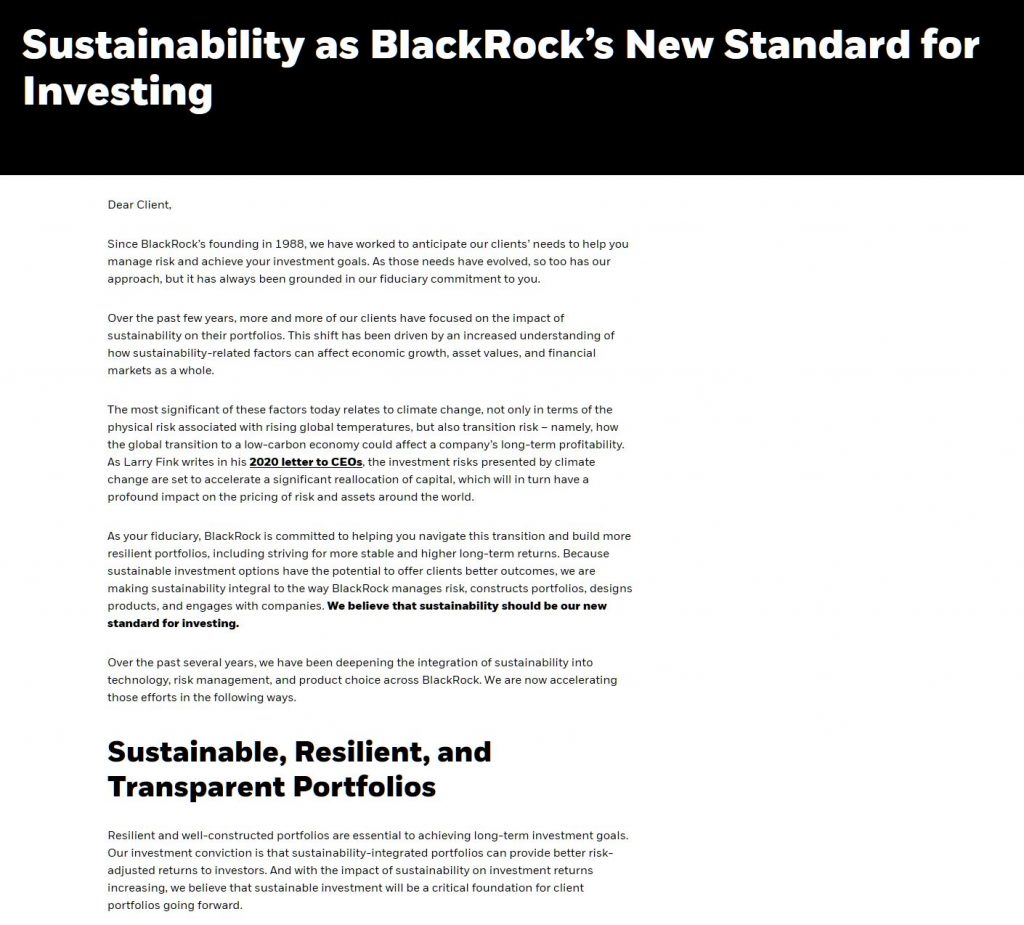
Now, in a letter to clients, BlackRock’s Global Executive Committee, led by company founder and CEO Laurence Fink, explained that the company would be withdrawing its investments in thermal coal producers, including any company that sources more than a quarter of its revenue from thermal coal production.
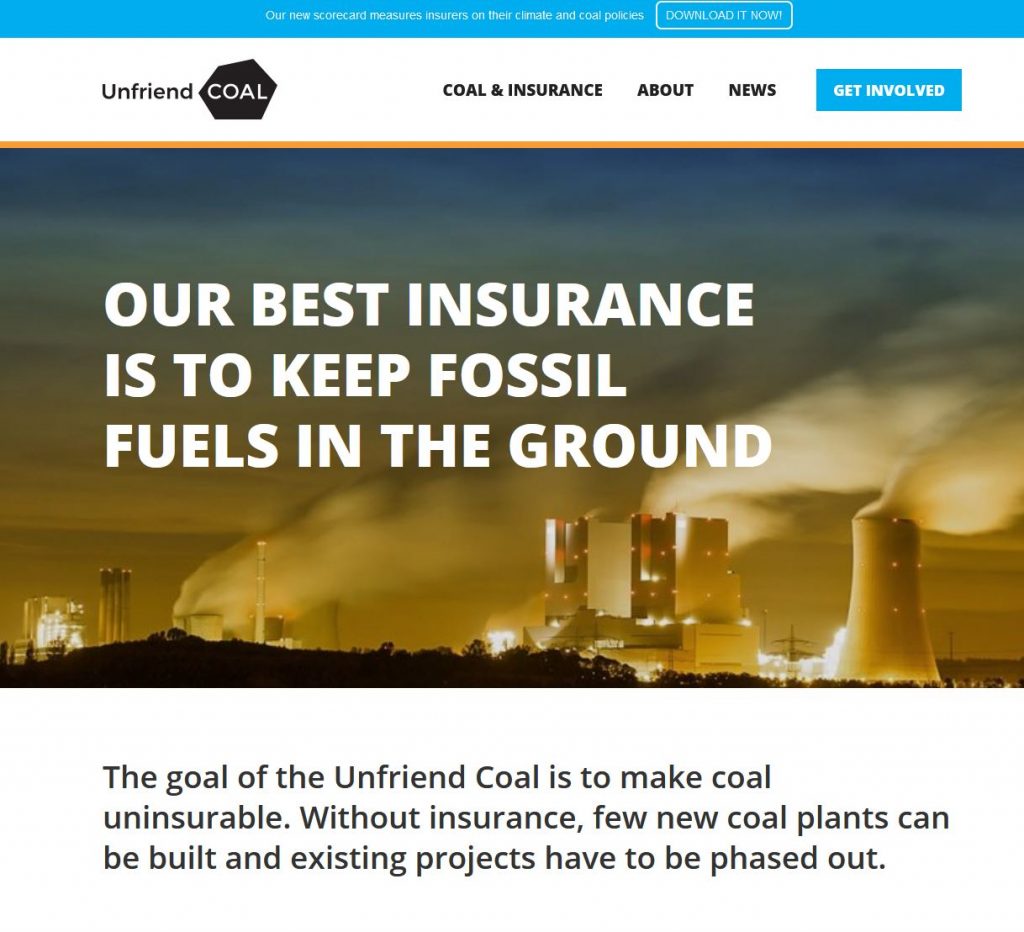
Announcements of this kind have come out steadily over the past couple of years. Virtually all the major Australian and European banks and insurers, and many other global institutions, have already announced such policies. According to the Unfriend Coal Campaign, insurance companies have stopped covering roughly US$8.9 trillion of coal investments – more than one-third (37%) of the coal industry’s global assets, and stopped offering reinsurance to 46% of them.
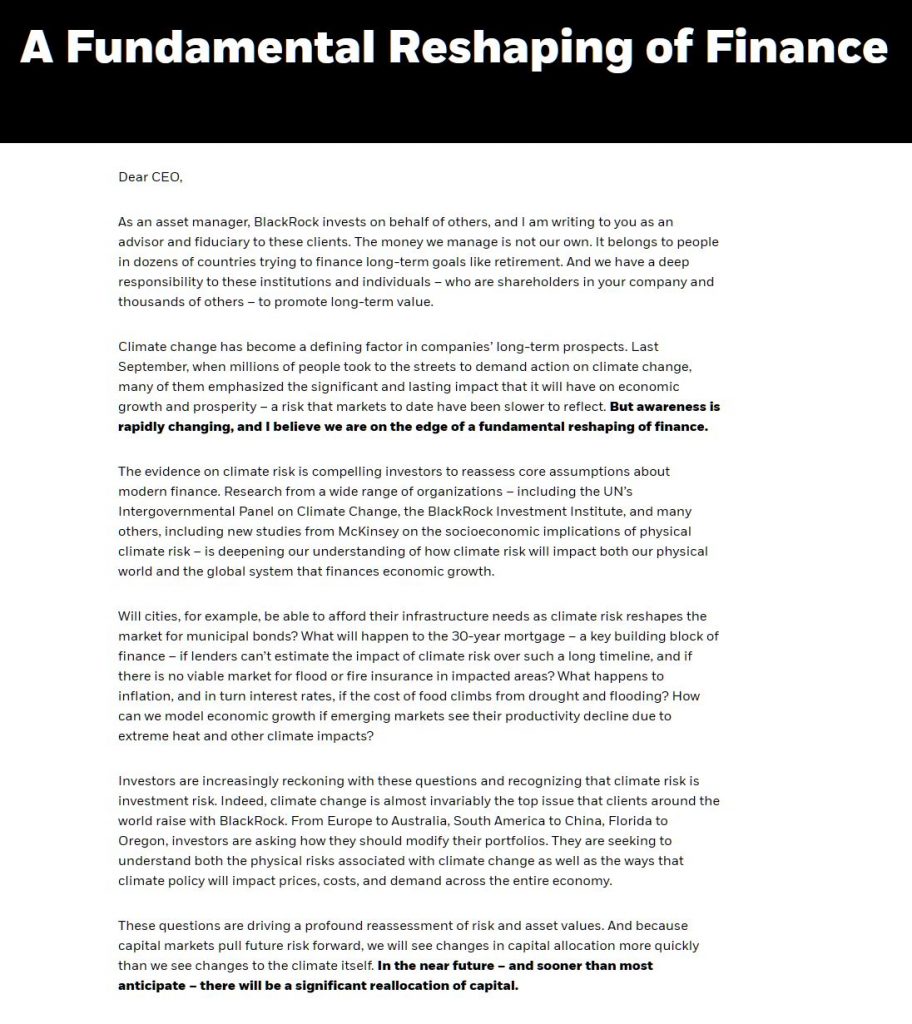
A separate letter to CEO’s starts with a clear reference to BlackRock’s ‘fiduciary duty’ to its investors. BlackRock’s own analysis shows global financial markets will be materially impacted by climate change, reflected in the Bank of England’s analysis of $20 trillion at risk. “BlackRock concludes that this stranded asset risk is not yet priced into the market, so as a fiduciary, BlackRock really has no choice but to act.”
“Thermal coal is significantly carbon intensive, becoming less and less economically viable, and highly exposed to regulation because of its environmental impacts. With the acceleration of the global energy transition, we do not believe that the long-term economic or investment rationale justifies continued investment in this sector,” the letter says.
“As a result, we are in the process of removing from our discretionary active investment portfolios the public securities (both debt and equity) of companies that generate more than 25% of their revenues from thermal coal production, which we aim to accomplish by the middle of 2020.
Environmental, Social, and Governance (ESG) Criteria are coming to the fore – Environmental – a set of standards for a company’s operations that consider how a company performs as a steward of nature. Social – examines how a company manages relationships with employees, suppliers, customers, and the communities where it operates. Governance – how its deals with a company’s leadership, executive pay, audits, internal controls, and shareholder rights.
“As part of our process of evaluating sectors with high ESG risk, we will also closely scrutinize other businesses that are heavily reliant on thermal coal as an input, in order to understand whether they are effectively transitioning away from this reliance.”
The move will see the investment giant dump around USD$500 million (A$725 million) in thermal coal investments.
And firms should note that Blackrock is going to flex its influence. “Given the groundwork we have already laid engaging on disclosure, and the growing investment risks surrounding sustainability, we will be increasingly disposed to vote against management and board directors when companies are not making sufficient progress on sustainability-related disclosures and the business practices and plans underlying them,” Fink said.
So, Blackrock’s Fink seems to have figured out the huge impact that climate change will have on not just money, but the world.
“Will cities, for example, be able to afford their infrastructure needs as climate risk reshapes the market for municipal bonds?” Mr Fink wrote in his letter to CEOs.
“What will happen to the 30-year mortgage – a key building block of finance – if lenders can’t estimate the impact of climate risk over such a long timeline, and if there is no viable market for flood or fire insurance in impacted areas? What happens to inflation, and in turn interest rates, if the cost of food climbs from drought and flooding? How can we model economic growth if emerging markets see their productivity decline due to extreme heat and other climate impacts?” he said.
BlackRock also announced that it would join the Climate Action 100+ initiative, that supports investors to actively engage with the companies they are invested in to assess, disclose and address the risk that climate change and the energy transition poses to the company and the value of investments. The Climate Action 100+ initiative includes the Australian based Investor Group on Climate Change, which supports Australian institutional
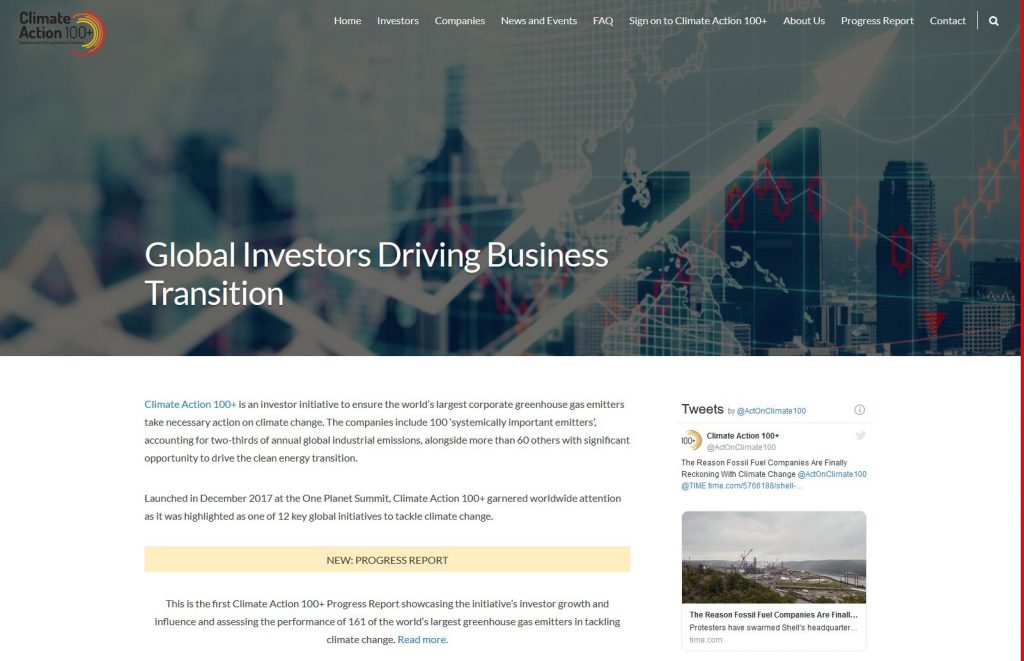
In 2019, the UK-based think tank InfluenceMap released a report that showed BlackRock was the leader of the asset management pack in terms of fossil fuel ownership. As at June 2018, the oil, gas and thermal coal reserves controlled by fossil fuel producers it holds represented an aggregated 9.5 gigatonnes of carbon dioxide emissions equivalent, with just under half of these emissions in thermal coal and equivalent to 30 per cent of total global energy-related carbon emissions in 2017.
“Among the 10 asset management groups with the largest aggregate fund AUM, BlackRock holds the most coal-intensive portfolios,” the report said. A -100% indicates full divestment while positive values indicates adding coal to the portfolio during the period 2011-2016.
“However, there are key differences between BlackRock’s passively and actively managed funds,” the report noted. “The group’s passively managed funds show a thermal coal intensity in 2018 of 680 t/US$m AUM, while its actively managed funds show a much lower TCI of about 300 tons/$m AUM, well below the global fund benchmark.”
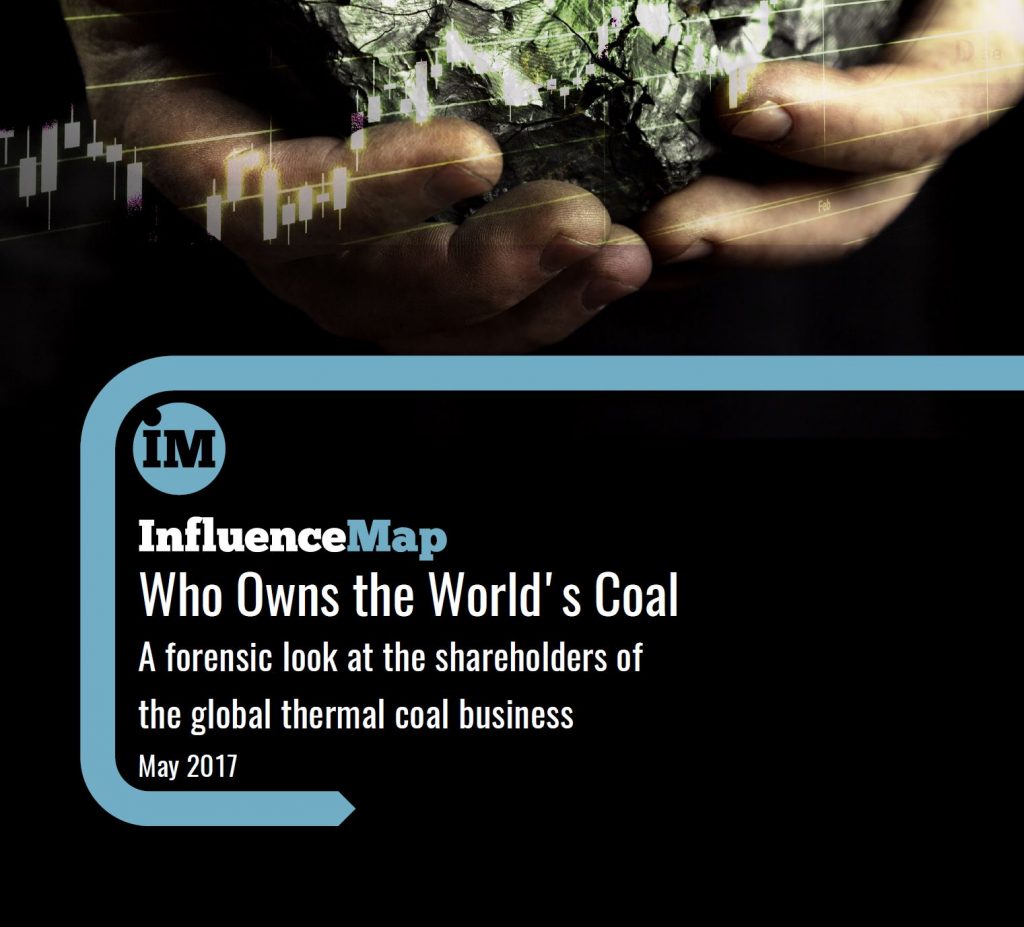
And significantly ESG investment strategies are growing in profitability, with new geographic trends adding to their value, according to Amundi Asset Management who analysed the performance of 1,700 companies across five investment universes. Their research – ESG investing in recent years: New insights from old challenges – found that ESG strategies tended to penalise ESG investors between 2010 and 2013, but rewarded investors after 2014. “We have observed a massive mobilisation of institutional investors on ESG,” they said. The global responsible investment is estimated to be $30.7 trillion USD, or two fifths of assets under management. This is a 34% growth in two years.
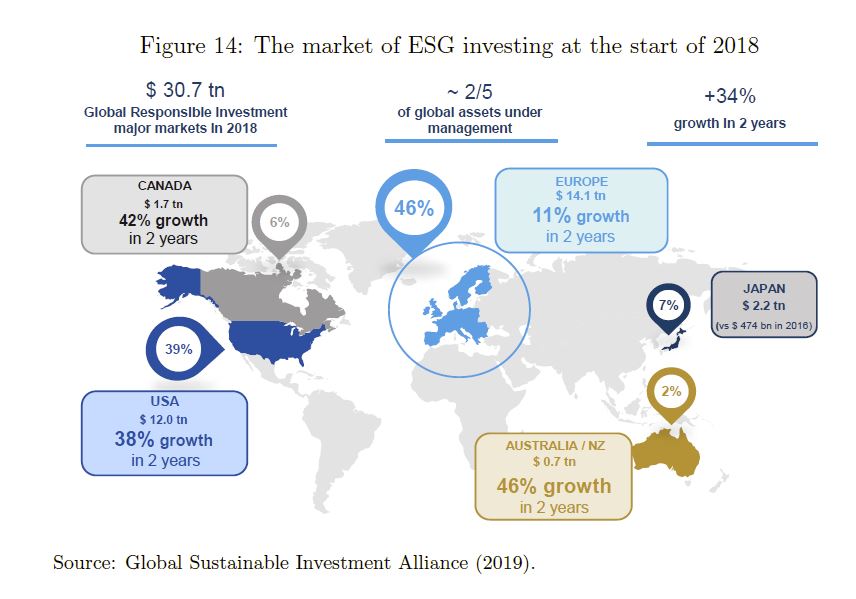
But here is the problem. Most of the money that BlackRock manages is wrapped up in passive investments, which track indexes. Indexes tend to contain the shares of the sort of companies that BlackRock’s active arm is now divesting from. So, what exactly BlackRock can do about that? Is this more than greenwash?
Mr Fink has said that BlackRock will be doubling its offerings of ESG ETFs and will work with index providers to expand and improve the universe of sustainable indices. The company will also simplify the process by which investors can integrate ESG into their existing portfolios by adding a fossil fuel screen and has also expanded its impact investment strategy.
But the contradiction between the company’s new activist stance and the passive replication of an energy-heavy index such as Australia’s is obvious. One solution might be for large mining companies such as BHP to dump their coal assets in order to remain part of both Blackrock’s actively managed (stock picking) and passively managed (all stocks) portfolios. This was discussed in a recent “The Conversation” article.
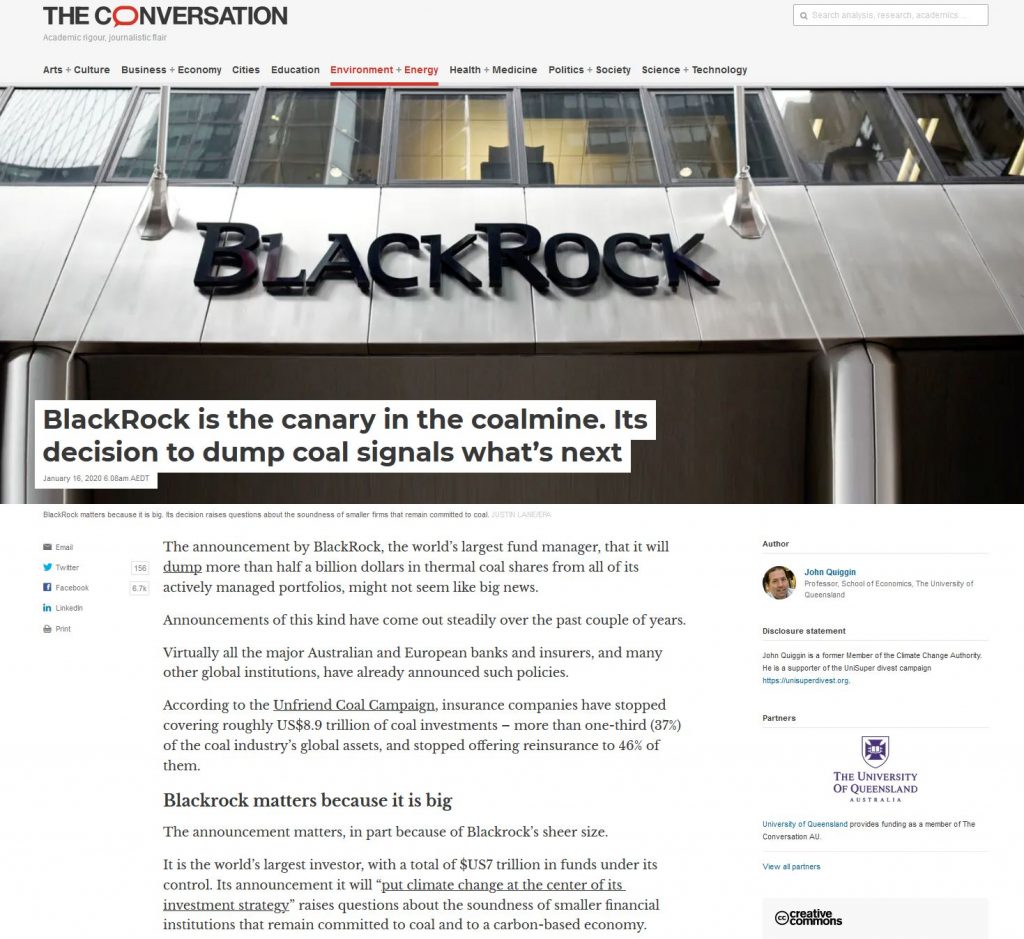
Another might be the development of index funds from which firms reliant on fossil fuels are excluded. It is even possible that the compilers of stock market indexes will themselves exclude these firms.
But once bond investors follow the lead of Blackrock and other financial institutions, divestment of Australian government bonds will likely follow. This process has already started, with the decision of Sweden’s central bank to unload its holdings of Australian government bonds.
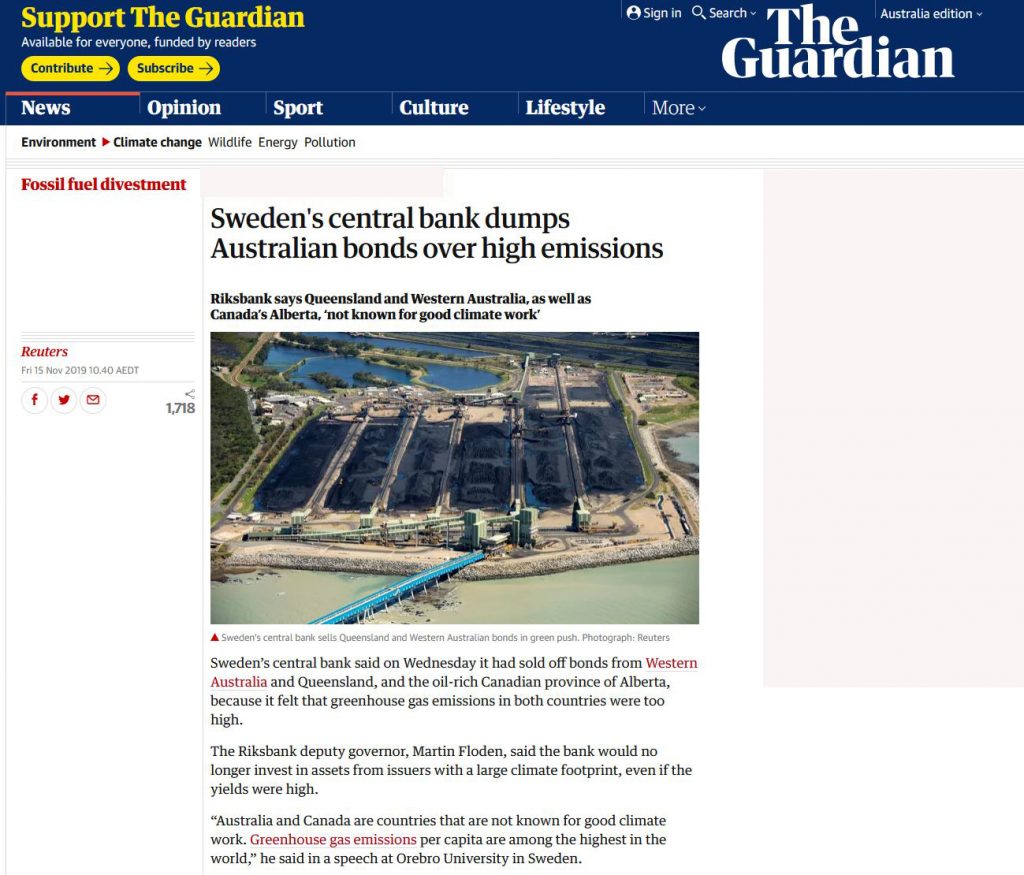
Taken in isolation, Sweden’s move had virtually no effect on Australia’s bond prices and yields. But the most striking feature of the divestment movement so far is the speed with which it has grown from symbolic gestures to a severe constraint on funding for the firms it touches.
The fact that the Adani corporation was unable to find a single bank willing to fund its Carmichael mine is an indication of the pressure that will come to bear.
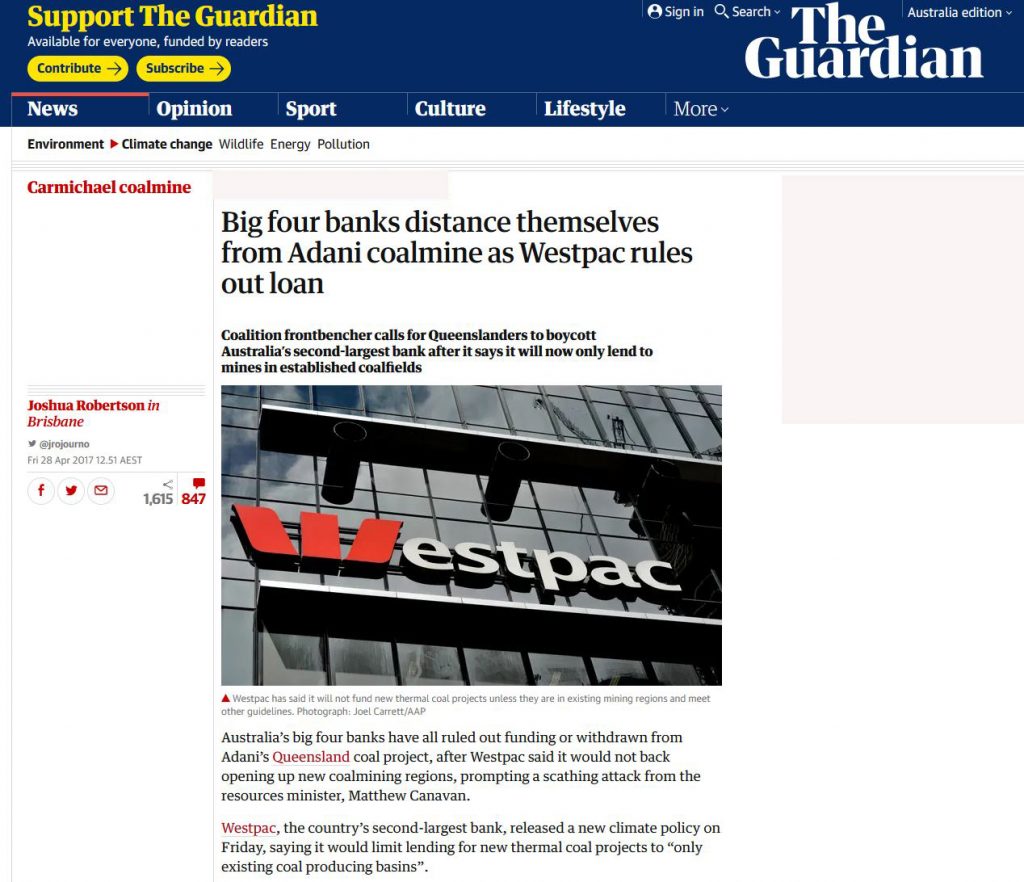
The effects might be felt before large-scale divestment takes place. Ratings agencies such as Moody’s and Standard and Poors are supposed to anticipate risks to bondholders before they materialise.
Once there is a serious threat of large-scale divestment in Australian bonds, the agencies will be obliged to take this into account in setting Ausralia’s credit rating. The much-prized AAA rating is likely to be an early casualty.
That would mean higher interest rates for Australian government bonds which would flow through the entire economy, including the home mortgage rates mentioned in the Blackrock statement.
So the government’s case for doing nothing about climate change (other than cashing in on past efforts) has been premised on the “economy-wrecking” costs of serious action. But as investments associated with coal are increasingly seen as toxic, we run an increasing risk that inaction will cause greater damage. So yes, Blackrock’s announcement is a real wake-up call, like it or not.
https://www.blackrock.com/au
https://theconversation.com/blackrock-is-the-canary-in-the-coalmine-its-decision-to-dump-coal-signals-whats-next-129972
https://www.theguardian.com/environment/2019/nov/15/swedens-central-bank-dumps-australian-bonds-over-high-emissions
https://www.theguardian.com/environment/2017/apr/28/big-four-banks-all-refuse-to-fund-adani-coalmine-after-westpac-rules-out-loan
https://growaldfamilyfund.org/institute-for-energy-economics-and-financial-analysis-ieefa.html
Homepage
http://www.climateaction100.org/

Thanks Martin.
This is such an in depth look at what this will truly mean if/when Blackrock follow through.
I had tears in my eyes, after reading this, and understanding the depth to what they are proposing, the actions that may well lead to great change, would it be too much to expect for strength like this from government?
As you’ve explained, it’s much more than a simple divestment plan. As they’re the majority player it speaks volumes as to just what is about to occur. For example, using their (Blackrock) power to vote against boards and Director’s, CEO’s and the likes …. this will send shivers down more than a few necks of the most powerful in the Fossil Fuel CARTEL.
I can only hope that the morons we have in Canberra, start to see our economy as much more important than being a giant hole in the ground, one to exploit ALL and sundry with. Oh I pray for someone in Canberra to provide genuine support for the innovation economy, and to understand the prosperity that comes through innovation, is that too much to ask?